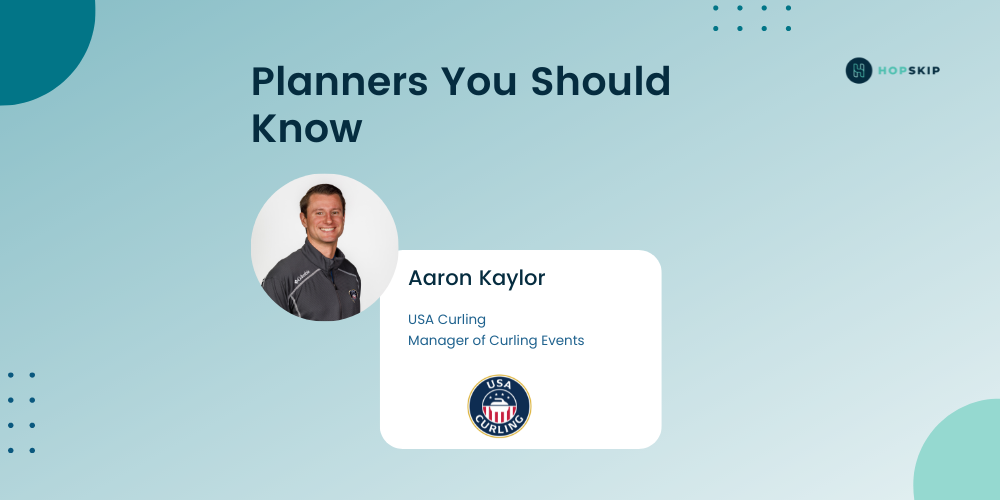This post is part of the HopSkip Planner Spotlight Series where HopSkip spotlights planners across the industry to bring awareness of how they adapted to COVID-19, communicating and lessons learned and sharing how they are viewing the meetings and events industry in a post-pandemic world.
Name: Aaron Kaylor
Company Name: USA Curling
Job Title: Manager of Curling Events
Years of Experience: 6
How did you get your start in the events industry? What made you pursue this role?
I went to school for Sports Management and learned that I enjoyed working events. I was able to gain some practical experience at my university, as well as through a number of internships. One of those internships was with the U.S. Olympic & Paralympic Committee and I knew from that point forward that I wanted to run events in the Olympic Movement. I started my first job with another NGB in 2016 and ultimately made my way to USA Curling last fall.
How do you compare planning your first in-person event post-pandemic, to planning meetings/events pre- Covid? What was different and unique? What was similar?
Getting back to in-person events was very similar to before, but also so different. We still needed to secure venues, hotels, staff, and vendors, but all of the sudden we also had to consider the COVID impact of each decision. Could venues be arranged in such a way to limit overlap between athletes and other teams, athletes and non-essential staff, and of course athletes and spectators? Did we need to double our hotel spend to make sure that we were limiting exposure between officials who would normally room together? Were we breaking any local rules/guidelines by operating concessions or bringing in vendors that would cause congestion on concourses. All of the same things needed to be done, but there were just so many new additional layers to that process.
What was your number one challenge in hosting your first in-person event(s) and how did you overcome it?
I think it would definitely have to be COVID testing. The first in-person event that I ran was the U.S. Olympic Trials – Diving (I've been fortunate enough to work with a few different sports), but testing was also a part of the Curling Trials and a number of national championships that we ran this past season. Also locating vendors who could fit our exact needs and budget was not easy.
What is the top learning that you uncovered from the last two years that you’re implementing in your planning process today? (any other tips or tricks you want to share?)
I've learned a lot. I feel like I know far too much about different types of COVID tests, incubation periods, and quarantines, but the biggest thing would have to be planning for the worst. It was easy to look ahead and say this can't go on forever at first, but accepting that COVID was going to be a part of event planning long term made a big difference in my approach.
Are you approaching contracting with hotels differently, post-pandemic?
Yes, one of the first things I do when looking at a hotel contract is to make sure that there is a COVID related cancellation policy.
Due to the pandemic, our events community had to evolve, adapt, and grow. Many planners started to embrace new technologies as a result of the pandemic. What new tech are you using today in your planning process as a result?
I can't take credit for this but we built vaccination status into our membership and event registration sites. Now rather than asking for proof of vaccination prior to every event, individuals can upload their information and the site does the rest.
Since education and relationships are two major pillars in the meetings and events industry, any suggestions on how other planners can learn and network with their peers across the industry?
Live networking conferences are back in full swing and I have always found those as a great way to connect with different destinations and venues. Conversations at events with fellow planners about what has worked for them is also quite valuable.
This post is part of the HopSkip Planner Spotlight Series where HopSkip spotlights planners across the industry to bring awareness of how they adapted to COVID-19, communicating and lessons learned and sharing how they are viewing the meetings and events industry in a post-pandemic world.
